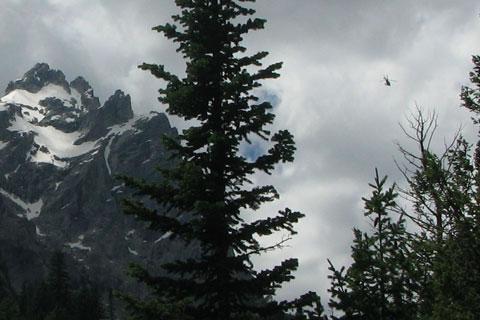| 417 | Hikers Code - Emergencies | 2011-06-13 |

You are responsible for yourself, emergencies (Hike Safe)
I spend a couple of hours each morning reading the news, online. In particular I look for news regarding hiking, climbing, bicycling, trails, mountains, greenways, etc. The majority of the news returns are about emergencies. Someone is lost, hurt, ill, cold, hot, or in someway discomforted and they need help. Most of the incidents are vague and many incidents are also probably inaccurately reported; but I still try to learn from the stories. I try to discover what the victim did wrong and what I could do differently. These mental investigations help build a data base of information for me to use in the field.
From my readings it is easy to see that most emergencies were actually bad decisions fulfilled through the consequences of actions (or inactions). For example, you can't really blame someone for not wearing proper footwear, but some shoes are slick and others are not. Wearing shoes that do not stick to the rock is a bad judgement and will eventually get the wearer hurt if they continue to hike on rock with those shoes. From my experiences: I bought a pair of trail running shoes because they were highly reviewed. The first time the shoes hit wet rocks, I busted it. The second encounter was the same. Decisions are hard to make. I just paid over $100 for those shoes; but I never wore the shoes again on a potentially wet trail! I didn't want to be an emergency waiting to happen.
In 2009 when we spent the summer climbing the Colorado Fourteeners, we learned a few good habits on avoiding emergencies ...
We discussed our packing decisions before each climb. We told each other what we were carrying and what we were leaving behind. The food, first aid gear, clothing, water, etc. that one of us carried, was actually important to both of us.
We actively talked about the route and the difficulties. A simple injury would have ended our trip, so we reminded each other to be cautious. There were times when we had to be extremely cautious and on top of our game. We reminded each other to focus.
It was important for us to eat, drink, and sleep so that we were ready physically and mentally for each day.
We planned ahead and knew all of the mountains and all of the routes.
We chose routes to climb and hike that were within our abilities. Some days we might feel that a harder, more exposed, scrambling route was doable, whereas on other days a simple long hike was questionable.
We had emergency plans for different scenarios and we even had one for our dog, Jake - an 85 pound golden retriever. If he was hurt or injured, we were planning on making a stretcher using our jackets and trekking poles and literally carrying him down the mountain. Yes, it would have been difficult to rescue him; but the other choice would have been unspeakable.
By starting early in the day and moving quickly, we avoided many hazards such as thunderstorms, rock fall, poor snow conditions, and novice climbers (these dangerous folks are notorious for tourists starts dislodging rocks).
We also avoided emergencies by practicing the other principles of the Hikers Code (knowledge, gear, leave plans, stay together, turn back).
Many emergencies can be avoided by making the right decisions. Stay within your abilities, carefully scaling up the adventures and you will gradually acclimate safely to the outdoor world.
Happy no emergency trails.
Hikers Code - Leave Your Plans